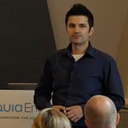There is great purpose here - a powerful alignment with evolution itself. One sees a clear path carved, not by wishful thinking or some human-centered planning exercise but by the cold, hard reality of iterative progress.
The character in this unfolding story is data, a shapeshifting force both raw material and the final arbiter of quality. It's a compelling subject, as messy and full of potential as an unruly ecosystem. The conflict surfaces when human desire for control collides with the inherent complexity of interconnected systems. A deep desire to grasp all the intricate processes stands in the way of actual improvement.
A turning point occurs by recognizing that control isn't about imposing a rigid rule system; it's about the graceful art of letting machines learn and then orchestrate the movement of value at a grander, and faster scale. A well-understood truth about the world unfolds here, namely that a system that can learn from experience will outperform a system that is merely a collection of rules.
Resolution has not been achieved, nor can it be. There is no finish line here, but the direction of travel becomes clear. It involves designing systems that can adapt and evolve. It's a system that learns globally rather than acting locally; it optimizes for overall results rather than point solutions; it supervises with a critical eye rather than imposing constraints; a clear shift towards a systems-based approach that favors emergence. The narrative emphasizes the crucial roles of components like feature platforms, inference services, and experimentation capabilities – all operating in a carefully controlled environment, showcasing the movement of elements from Genesis towards custom. There's something so elegant about the feature platforms, that, instead of making everything at once are rather allowing individual features to emerge.
These aren't merely technical choices; they are strategic bets on the power of data, automation, and scientific iteration - in line with the evolutionary patterns and the very laws of nature that unfold in the economic sphere. They demonstrate an almost organic progression from rule based thinking toward a more natural process of evolution using data as a guide - they simply map the terrain; the map becomes the territory.
The future, seen through this framework, isn't a product of arbitrary design but rather the result of a deeply embedded process of experimentation, learning and adaptation. The movement here should always aim towards greater levels of autonomy and efficiency for the whole system, an inherent desire, seen even in the deepest recesses of physics and biology.
